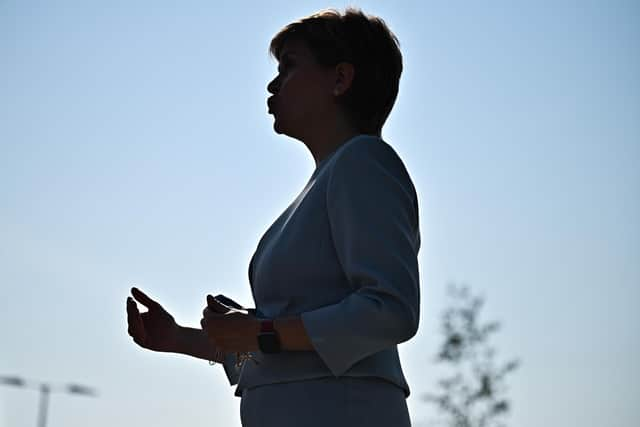Scottish independence referendum: Nicola Sturgeon is playing her cards to maximum effect – Joyce McMillan
On one hand, there is the implacable demand of many in her party that she take advantage of the travails of the Westminster government, shambolic, disreputable, and morally compromised, to hold a second referendum, which, in their view, she would win.
On the other, there is the adamant refusal of Boris Johnson to consider issuing a Section 30 order which would permit a referendum on the same terms as in 2014; and the First Minister, a lawyer to her fingertips, is not the woman who would want to preside over a referendum with any inferior legal status.
Advertisement
Hide AdAdvertisement
Hide AdIn the middle, there are large numbers of Scottish voters who, traumatised by the triple crisis of Brexit, the pandemic, and war in Europe, may feel cautious at best about initiating further change, whatever their views on independence.
What we saw on yesterday, though, was a cautious but clever and highly experienced politician playing the cards she holds to maximum effect.
The 2021 Holyrood election may be the vote that time forgot, so far as many unionist commentators are concerned; the result does not fit their preferred narrative, and is therefore often ignored.
In truth, though, that election gave supporters of independence and a second referendum 72 MSPs out of 129, in a parliament elected by a much fairer system than Westminster has ever seen; and that result puts those who think that democratic mandate should not be acted upon at a distinct disadvantage, in any argument over democracy.


Secondly, Nicola Sturgeon’s shrewd decision to have the Lord Advocate refer the referendum bill immediately to the UK Supreme Court, for a test of its legality, both tends to speed up what could otherwise have been an endlessly delayed process of legal challenge, and emphasises the Scottish Government’s strict determination to adhere to the rule of law both at home and internationally, in a week when the UK Government has once again shown that it can no longer be trusted in that respect; a position which is likely to play well with Scottish voters, who by and large like to see things done properly.
And then finally, Nicola Sturgeon leads a party that, when its dominant position is filtered through the Westminster first-past-the-post system, tends to emerge as the holder of an overwhelming majority of Scotland’s Westminster seats, currently 48 out of 59.
This factor gives some weight to Nicola Sturgeon’s suggestion that if the UK Supreme Court does not affirm the legality of a consultative referendum in October 2023, her party will then treat the next UK general election as a single-issue referendum on the matter of Scottish independence.
As Margaret Thatcher once observed, under Westminster rules a simple majority of SNP MPs in Scottish seats at Westminster can arguably be seen as a mandate for independence; and by 2024, it’s possible that the shrewd manoeuvres of Nicola Sturgeon’s government will have brought the UK to the point where it either has to reform in ways that fully recognise the right to self-determination of its four constituent parts, or face the possibility of full constitutional meltdown, not only in Scotland, but also in Northern Ireland.
Comments
Want to join the conversation? Please or to comment on this article.

